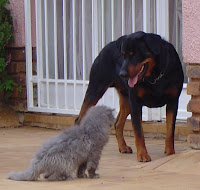 |
| Slažu se kao pas i mačka :) |
- If two colours match, we say "slažu se". For example: Plava se slaže sa žutom, ali se ne slaže sa crvenom (slagati se = to match)
- If a brother and sister get on/along with each other, we say "oni se slažu". For example: Baš imaš sreće, tvoj brat i ti se dobro slažete. (You are rally lucky, your brother and you get along very well)
- If you agree to go out with your friend, you will say: "slažem se". For example: Hoćeš li da idemo u restoran večeras ? Važi, slažem se! (Would you like to go to a restaurant tonight ? OK, I agree!)
- If two people are at each other's throats, i.e." fight like cat(s) and dog(s)" you can similarly describe it in Serbian as "slažu se kao pas i mačka"!
The simple present tense conjugations of the verb SLAGATI:
(Sg) Slažem se - slažeš se - slaže se (Pl) Slažemo se - slažete se - slažu se
The past tense verb forms
- Imperfective aspect:
( _ denotes the auxiliary "to be" which shows which person is the sentence referring to)
(Sg) M slagao _ se, F slagala _ se, N slagalo _ se
(Pl) M slagali _ se , F slagale _ se, N slagala _ se
- Perfective aspect:
( _ denotes the auxiliary "to be" which shows which person is the sentence referring to)
(Sg) M složio _ se, F složila _ se, N složilo _ se
(Pl) M složili _ se , F složile _ se, N složila _ se
The simple future forms:
- Imperfective aspect:
(Sg) Slagaću se - slagaćeš se - slagaće se
(Pl) Slagaćemo se - slagaćete se - slagaće se
- Perfective aspect:
(Sg) Složiću se - složićeš se - složiće se
(Pl) Složićemo se - složićeš se - složiće se
* You might also find the word "slagati" which means "to lie", but the stress pattern is different (with the first "a" being short) and there is no reflexive " se".
** You might also find the word "slagati" with the same stress pattern as "slagati se" (to agree), but without the reflexive "se". In that case, the verb "slagati" means "to stack things" or " to put things in order"

.png)











No comments:
Post a Comment